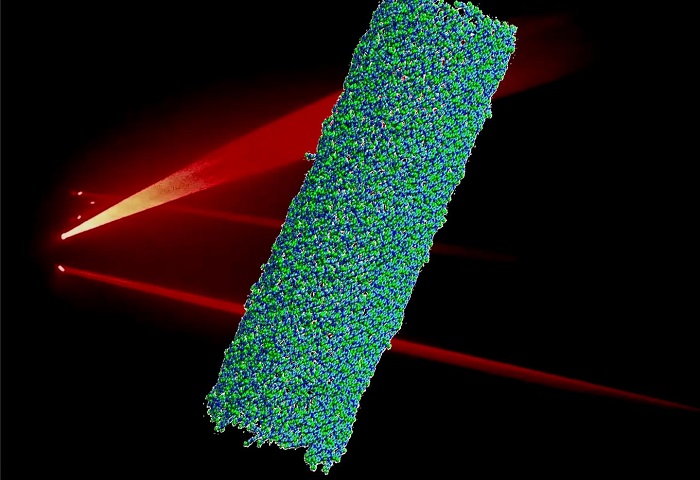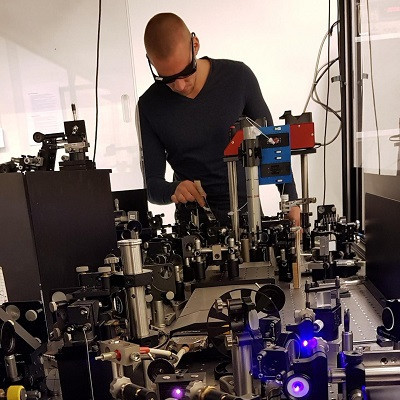Scientists typically prefer to work with ordered systems. However, a diverse team of physicists and biophysicists from the University of Groningen found that individual light-harvesting nanotubes with disordered molecular structures still transport light energy in the same way. By combining spectroscopy, molecular dynamics simulations and theoretical physics, they discovered how disorder at the molecular level is effectively averaged out at the microscopic scale. The results were published on 26 September in the Journal of the American Chemical Society.
The double-walled light-harvesting nanotubes self-assemble from molecular building blocks. They are inspired by the multi-walled tubular antenna network of photosynthetic bacteria found in nature. The nanotubes absorb and transport light energy, although it was not entirely clear how. ‘The nanotubes have similar sizes but they are all different at the molecular level with the molecules arranged in a disordered way,’ explains Maxim Pshenichnikov, Professor of Ultrafast Spectroscopy at the University of Groningen.
Single-molecule
Björn Kriete, a PhD student in Pshenichnikov’s group, used spectroscopy to measure how light-harvesting systems, each consisting of a double-wall nanotube composed of a few thousand molecules, behaved. ‘We examined around fifty of these systems and found that they had very similar optical properties despite showing significant differences at the molecular level.’ Measuring individual light-harvesting systems requires the use of the latest single-molecule spectroscopy techniques. Earlier studies only looked at bulk material that contains millions of these systems.
So, how can disorder at the molecular level be reconciled with individual systems’ very ordered responses to light? To answer this question, Pshenichnikov received help from both the Molecular Dynamics group and the Theoretical Physics group at the University of Groningen. Postdoctoral researchers Riccardo Alessandri and Anna Bondarenko were responsible for simulating the nanotube system in solution. ‘It was quite a challenge to simulate a system with thousands of molecules, to try to compute the disorder in an efficient way,’ Alessandri explains. Overall, the simulation contained around 4.5 million atoms.
Tuning forks
In the end, the simulation revealed a bigger picture that was in agreement with the experimental results obtained by Pshenichnikov, but it also revealed additional molecular detail. This helped Jasper Knoester, Professor of Theoretical Physics, to connect all the dots. He recognized a pattern in the data that is referred to as ‘exchange narrowing’. This effect is responsible for averaging out small differences at the molecular level. ‘You can compare it to the classical experiment with tuning forks in which a vibration in one fork can transfer to a second fork, if it is tuned to roughly the same frequency,’ Knoester explains.

Similarities Emerging from Disorder: Disordered molecular structures of artificial light-harvesting complexes produce well-defined optical properties.
The energy that is harvested by the light sensitive systems is transported in the form of excitons, which are quantum-mechanical wave functions, comparable to vibrations. Each exciton spreads out over 100 to 1,000 molecules. Pshenichnikov: ‘These molecules are not ordered, but they are linked through dipole-dipole coupling.’ This linkage allows the molecules that make up the nanotubes to vibrate together. Minor differences between them are averaged out, which results in light-harvesting systems that have similar optical properties.
Bricklayer
It is now clear how ordered optical behaviour can emerge from a disordered molecular structure. The link between the molecules is vital. Pshenichnikov: ‘Think of a poorly trained bricklayer, who just puts bricks together in no particular pattern. If they are cemented to each other well, you still end up with a strong wall.’ For the nanotubes, this means that a certain amount of disorder is quite acceptable in these light-harvesting systems. ‘I believe that the implications are even wider,’ says Pshenichnikov. ‘The next step is to investigate how these properties can emerge in systems and use this in the design and creation of new functional materials.’
Read the original article on University of Groningen.
